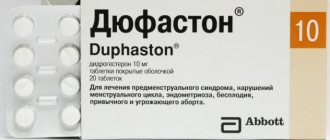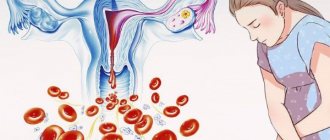Possible reasons for missed periods
As already mentioned, the absence of menstruation in due time can be caused by an accidental pregnancy; in its absence, a cycle failure occurs due to other reasons. This leads to two goals for calling your period prematurely:
- early termination of pregnancy;
- return of the cycle to its previous regularity.
Before using methods to induce menstruation, you should make sure you are pregnant, since almost all methods of accelerating the cycle are abortifacient. The easiest way to find out about pregnancy is to buy special tests at the pharmacy (preferably two or three to exclude errors). If the tests show a negative result on the second and third days of the delay, you can wait a few more days for a possible increase in the level of hCG (pregnancy hormone) and be tested again. If it is not possible to wait, you should take a blood test to determine hCG and rule out conception.
Before inducing menstruation artificially, you first need to make sure there is no pregnancy
If pregnancy has occurred, but the woman does not want to keep it, you should not resort to abortion methods at home - this is life-threatening. Regardless of the method of termination of pregnancy chosen: taking medications, exposure to heat, or using traditional medicine methods, the woman faces serious bleeding that cannot be stopped. In the case of a medical abortion, complications are also possible, but they do not lead to death.
Important! To terminate an unwanted pregnancy, you must contact the antenatal clinic. With an abortion performed at home, there is a high risk of breakthrough bleeding.
In the absence of pregnancy, there are two groups of reasons that cause a delay in menstruation:
- physiological, the cycle shift is 5–7 days (except for the lactation period): adaptation of the body to new natural conditions,
- physical and sports activities;
- emotional tension and stress;
- following a low-calorie diet;
- hormonal changes: puberty, breastfeeding, menopause;
- “withdrawal syndrome” after long-term use of hormonal contraceptives;
- taking medications for emergency contraception;
- colds, ARVI, chronic diseases (gastritis, diabetes, malfunction of the thyroid gland);
- inflammation of the genital organs (adnexitis - simultaneous inflammation of the ovaries and fallopian tubes, oophoritis - inflammation of the ovaries, etc.);
As follows from the list, there can be many reasons for the disruption of the menstrual cycle. If, in addition to the absence of menstruation, a woman is bothered by other symptoms (pulling pain in the lower abdomen, fever, chills, uncharacteristic discharge, weakness, etc.), she should consult a doctor for further examination.
Video: why do periods disappear?
How to induce your period at home with aspirin
Women of reproductive age often face the problem of painful menstruation.
If the pain is not too severe, you can endure it, but in the case of intense pain, you should definitely check with your gynecologist for a list of menstrual pain medications that can be taken to relieve menstrual pain. Aspirin for menstruation is used in many countries, but due to the presence of a large number of contraindications, not every woman can use it without a doctor’s prescription. Let's consider the features of taking this medication during critical days.
Effect of the drug
Acetylsalicylic acid belongs to the group of non-steroidal anti-inflammatory drugs characterized by analgesic effects. It is an analgesic with antipyretic and anti-inflammatory effects. Its mechanism is the irreversible inactivation of cyclooxygenase enzymes, which plays an important role in the synthesis of prostaglandins.
Composition and release forms
The drug is available in tablet form. White tablets have a flat or flat-cylindrical shape with beveled edges.
The main active ingredient in the drug is acetylsalicylic acid; there are tablets of 100 and 500 mg of the main component. Additional substances in the medicine are powdered cellulose and corn starch.
Indications and contraindications
Aspirin is recommended for toothache, headache, neuralgia, migraine-like pain and muscle pain.
The drug is also taken to reduce fever caused by inflammatory and infectious diseases.
Some experts recommend using aspirin during menstruation to relieve pain, but in this case it is necessary to take into account all the contraindications that the patient has to taking this medication.
We list the absolute contraindications to the use of acetylsalicylic acid:
- diseases of the digestive tract. Aspirin irritates the mucous membrane and provokes the formation of ulcers;
- chronic bronchitis, asthma. The drug can cause spasm of the bronchioles and bronchi and thereby provoke an asthma attack;
- pregnancy in the first trimester and lactation period.
Relative contraindications include diseases of the liver, biliary tract, trophic ulcers on the lower extremities caused by varicose veins, acute and chronic forms of pyelonephritis. You should also not take aspirin if you have problems with the central nervous system.
Side effects
Taking aspirin in the wrong dosage can cause side effects.
In some women, an overdose of acetylsalicylic acid can cause tinnitus, dizziness, a sharp drop in blood pressure, nausea, including vomiting and stomach pain.
Taking aspirin during menstruation should be done with great caution, as it can cause heavy bleeding, leading to the development of anemia. Only emergency medical care can stop such bleeding.
Use on critical days
Most experts are confident that the duration and intensity of menstrual flow depends on the individual characteristics of the female body, so every woman should use specially selected drugs to eliminate pain during her menstrual period.
Many people believe that aspirin should not be taken during menstruation, since it affects blood clotting, preventing blood clots.
At the same time, one of the indications for the use of aspirin is algomenorrhea, accompanied by cramping, acute pain in the lower abdomen during menstruation, combined with nausea, dizziness and headaches.
Let us consider in more detail how and why to use this drug for pain during menstrual periods and how to use aspirin to correct the menstrual cycle.
Pain during menstruation has become commonplace for most women of reproductive age. If at the same time the motor activity of the fair sex does not suffer and the general state of her health does not deteriorate, then this can be considered a variant of the norm. But very often, with severe menstrual pain, algomenorrhea is diagnosed, which has 3 degrees of severity:
- A mild degree is accompanied by minor discomfort. To remove it, you can take 1 aspirin tablet, but the general well-being is not affected, the woman retains physical activity, and the next day the pain completely disappears.
- Average. The sensation of pain is moderate and lasts about 2 days, while motor activity partially suffers, performance decreases, in such a situation it is recommended to drink aspirin in sufficient quantities.
- A severe degree of algodismenorrhea is accompanied by severe pain, which is not relieved even by painkillers; in addition to impaired motor activity, there is a disruption in the functioning of the entire body. Diarrhea, fever, and chills may appear. Very often, the cause of such intense pain is endocrine diseases and hormonal imbalance, which in some cases may require hospitalization in a hospital.
Source: https://ginekologiya-urologiya.ru/menstruaciya/kak-vyzvat-mesyachnye-v-domashnih-usloviyah-s-pomoshhyu-aspirina
The danger of forced cycle acceleration
It should be understood that if the absence of menstruation is not caused by pregnancy, then there are reasons for this. If menstruation is always not cyclical, and the range is from 2 to 6 days, this may be a feature of the body. In the case where the delay is from 6 to 10 days, you can try to independently return the start date of the “critical days” to the previous circles, but visiting a gynecologist in this case is still the best choice.
Like any intervention in the body, speeding up the cycle can have negative consequences for health
There are situations when artificial influence on the arrival of menstruation poses a danger to a woman’s health:
- The delay is not 10 days, but more (for example, 1 month). It is no longer possible to do without contacting a specialist, since the cause of such a failure can be dangerous conditions, for example, an ectopic pregnancy. In this case, when trying to influence the cycle with medications or other methods, the woman may experience bleeding, as well as possibly incomplete removal of the fertilized egg.
- An intrauterine device (IUD) is installed in a woman's uterus. When using drugs and herbs that stimulate blood circulation, the IUD may be rejected, bleeding and injury to the walls of the uterus. The doctor should advise about possible delays in menstruation in the first months after installation of the IUD.
- The woman has hemophilia (a disease based on reduced blood clotting) or has endocrine system disorders (hypo- or hyperthyroidism, diabetes mellitus, etc.).
- The woman underwent long-term hormone replacement therapy.
It should be remembered that with any interference in the natural processes of the body from the outside, a hormonal imbalance occurs, the consequences of which are unpredictable. It is worth weighing the pros and cons before trying to influence the menstrual cycle.
Aspirin during menstruation: for pain, to induce regulation if there is a delay – Site about the menstrual cycle
Painful sensations during menstruation are a fairly common problem among the fair sex.
To eliminate pain, women in most cases use various medications, including acetylsalicylic acid. Aspirin has long been very popular among patients.
However, it is important to remember that this drug is not as harmless as it might seem at first glance. It must be taken with caution and only with the prescription of a specialist.
Contraindications for use
According to most experts, it is quite difficult to give a definite answer to the question of whether it is allowed to use aspirin during the menstrual cycle.
When taking this medicine, you must take into account any side effects that may occur.
Restrictions on the use of a medication can be divided into two groups: absolute and relative .
The following contraindications of the first type exist:
- Any diagnosed pathologies of the stomach and esophagus. Aspirin has an irritating effect on the mucous membrane, which can provoke the development of an ulcerative process.
- The drug should not be used during pregnancy , especially in the 1st and 3rd trimesters. Similar restrictions also apply during breastfeeding.
- Experts do not recommend acetylsalicylic acid if the patient is diagnosed with chronic bronchitis with an asthmatic component . In this case, the medicine acts as a provoking factor, which leads to spasms of the bronchioles or bronchi. In turn, this intensifies attacks of bronchial asthma.
We must not forget about the relative limitations, in the presence of which therapeutic measures with aspirin are not recommended. In such situations, the doctor warns the patient about possible consequences during treatment.
Relative contraindications include :
- pathologies of the biliary tract and kidneys;
- acute or chronic form of pyelonephritis;
- ulcers of the trophic type, affecting the feet and legs, the development of which can be provoked by varicose veins.
It is not recommended to use aspirin to eliminate pain even if there are problems with the central nervous system .
Reviews from women
From time to time I experience a delay in my menstruation. The gynecologist advised using aspirin with honey, diluted in water. The product helps me, but I try to use it only in cases of severe need and after I make sure that there is no pregnancy.
Anna
Conclusion
Since aspirin has many side effects, it should be taken with extreme caution and only after consultation with your doctor. If your condition worsens, you should immediately seek medical help.
Source:
Aspirin during menstruation: is it possible to drink acetylsalicylic acid during menstrual pain and during delay
Painful menstruation is a phenomenon that almost every woman of reproductive age faces.
Sometimes the pain is very severe and significantly affects everyday life, so to relieve the unpleasant symptom one has to resort to various medications, in particular acetylsalicylic acid derivatives. However, using aspirin during menstruation is a rather risky and not always justified step.
Pharmacological properties of the product
Aspirin, or acetylsalicylic acid, is a non-narcotic non-steroidal analgesic that has analgesic, anti-inflammatory and antipyretic effects. It is included in the WHO list of essential medicines, as well as in the list of vital medicines in the Russian Federation.
Acetylsalicylic acid effectively suppresses the formation of thromboxanes and prostaglandins, since it is an inhibitor of cyclooxygenase, an enzyme actively involved in their synthesis.
Aspirin acts in the same way as other drugs in the NSAID group (for example, ibuprofen and diclofenac): it limits the energy supply of the inflammatory process by inhibiting ATP synthesis, normalizes capillary permeability and minimizes the algogenic effect of bradykinin.
The drug is used to treat acute and chronic pain, thrombosis, fever and various inflammatory diseases. Small doses of acetylsalicylic acid significantly reduce the likelihood of stroke and heart attack.
There is also some evidence that aspirin is effective in preventing infertility, preeclampsia, and colorectal cancer. In some cases, the drug is also used in veterinary medicine.
Side effects and contraindications
The main and most dangerous side effect of acetylsalicylic acid is its ability to thin the blood, which can lead to various bleedings (primarily in people suffering from coagulation disorders). In addition, aspirin has a pronounced negative effect on the gastrointestinal mucosa. As a result, absolute contraindications to the use of aspirin are:
- the presence of any pathologies of the stomach and esophagus;
- hemophilia and other pathologies with a tendency to bleeding;
- chronic bronchitis with an asthmatic component;
- periods of pregnancy and lactation;
- individual intolerance to salicylate.
For certain pathologies, treatment with acetylsalicylic acid is undesirable and can lead to a number of negative consequences, therefore the decision on the advisability of such therapy is made exclusively by the attending physician. Such conditions include:
- various stages of pyelonephritis;
- trophic ulcers against the background of varicose veins;
- dengue fever;
- pathologies of the liver and biliary tract;
- the initial stage of diabetes;
- postoperative period;
- problems with the central nervous system.
In addition, it is strongly recommended not to take aspirin without the advice of a specialist for children and adolescents under 16 years of age, as this increases the risk of developing Reye's syndrome, a rare but extremely dangerous condition that is life-threatening.
With uncontrolled use of the drug, chronic overdose is often observed, especially severe in children and fatal in approximately 25% of cases. A single dose of aspirin leads to acute poisoning with all the accompanying symptoms, but the mortality rate from such an overdose is only 2%.
Features of taking aspirin during menstruation
The opinions of experts on whether it is possible to take aspirin during menstruation are very contradictory, but the majority still recommends taking some alternative analgesic so as not to provoke increased discharge and uterine bleeding.
If a woman unknowingly takes acetylsalicylic acid and notices a significant increase in the volume of menstrual blood, it is best to immediately consult a doctor, and if this is not possible, take 1-2 tablets of etamsylate and lie quietly for several hours.
However, there are also indications for the use of aspirin for pain during menstruation, for example, severe algomenorrhea caused by increased production of prostaglandins.
In this case, doctors usually recommend starting to take the drug 1-2 days before the expected date of menstruation.
But in case of prolonged and heavy bleeding, as well as the presence of absolute contraindications, it is necessary to select another NSAID drug that does not affect the process of thrombus formation.
Source: https://magadan-infbol.ru/narusheniya-tsikla/aspirin-pri-mesyachnyh-ot-boli-dlya-vyzova-regul-pri-zaderzhke.html
Acceleration of the arrival of menstruation ahead of schedule
If, when menstruation is delayed, the cause may be pregnancy, physiological reasons and diseases, then the woman makes the decision to call her period a few days earlier than due on her personal initiative. Thus, the reason for postponing “critical days” may be:
- long trip;
- participation in sports competitions;
- vacation at sea;
- a serious event, a banquet and other situations when the arrival of menstruation will be extremely undesirable.
There are several ways to speed up the cycle:
- exposure to hormonal drugs that help reduce the amount of estrogen;
- the effect of heat on the pelvic organs, and as a result, increased blood supply to the genital organs;
- influence on the contractility of the uterus for rapid rejection of the endometrium.
Video: how to induce menstruation ahead of schedule
Medicines
To speed up the cycle, it is more recommended to use drugs with progesterone, as well as to induce menstruation (Duphaston and its analogues). The peculiarity is that you need to choose the right date to start taking the medicine. So, if you start taking pills before ovulation, i.e. on days 10–11 of the cycle, this will cause the opposite effect: the hormonal drug will begin to lower estrogen in the blood and delay ovulation by several days, thereby lengthening the menstrual cycle. Taking medications after the ovulation process will affect progesterone levels: increasing the concentration of the hormone in the blood will accelerate the maturation of the endometrium and the “critical” days will come earlier. So, taking Duphaston (or Utrozhestan) should start 3 days before the expected menstruation with a course of 5 days. If your period has not arrived, then most likely the woman is expecting a baby. Taking the drug does not have a negative effect on the fetus or the course of pregnancy.
Recommendations for taking other hormonal medications to speed up your cycle:
- Norkolut - taking it should be started approximately in the middle of the cycle before ovulation, after 5 days the drug is discontinued and menstruation is expected to arrive in another 2 days;
- hormonal oral contraceptives (OCs).
OCs supply the necessary hormones, then this process ends abruptly (after taking the pills stops), causing bleeding.
If you take 2-3 more tablets, without a break, start a new pack of OCs after finishing the previous one, or stop taking the drug earlier due date, you can adjust the arrival of menstruation to your plans; - Pulsatilla - you need to take the homeopathic medicine in the morning for 3 days, after which menstruation will begin in a day (maximum three).
Traditional medicine and herbs
Traditional medicine also has its own recipes in case of forced acceleration of the cycle.
Onion peel decoction
One of the most effective ways to shift the onset of menstruation is through the stimulating effect of a decoction on the walls of the uterus. The amber color of the finished product indicates the correctness of its preparation and optimal saturation.
Ingredients:
- dry onion peel - 25 g;
- water - 1 l.
Preparation:
- The husks are ground to make the decoction faster.
- The required amount of husk is poured with water, brought to a boil over high heat, then simmered over low heat for half an hour.
- The mixture is infused for 12 hours, then filtered.
Take half a glass of onion peel decoction three times a day before eating for 5 days. If the broth is too strong and brown in color, you should dilute it with boiled water.
Video: preparing onion peel infusion
Iodine bath
This method is only suitable for those women who do not suffer from hypertension.
Preparing the bath:
- run a full bath of hot water;
- add 10 drops of iodine solution and two packs of table salt to the water;
- Stir the water until the salt is completely dissolved.
Take a bath for at least 20 minutes. For greater effect, you can do physical exercises beforehand. The remedy is effective only at the end of the cycle, so you can induce menstruation 2-3 days earlier.
Tansy infusion
An effective, but far from harmless means to speed up the cycle. The extract of this plant causes the walls of the uterus to contract and promotes the rapid rejection of the endometrium. It is strictly forbidden to increase the dosage of the infusion in order to avoid a disastrous result, since this plant itself is toxic.
Medicinal plants, including tansy, pose no less a threat if taken incorrectly than manufactured drugs, but it is much easier to get an overdose when using them
Ingredients:
- tansy flowers - 25 g;
- boiling water - 1 l.
Preparation:
- Pour the required number of flowers with a liter of boiling water.
- Leave for an hour.
- Strain the finished product.
To speed up menstruation, take tansy infusion one-third of a glass three times a day for 3 days. Tansy and decoctions and infusions prepared on its basis are abortifacients used for centuries. Before drinking these drinks, you need to make sure that you are not pregnant to avoid fetal death.
Milk and iodine
When choosing this remedy, you should remember the toxicity of iodine when ingested: just 3 g of iodine can cause irreversible consequences in the functioning of internal organs. It is believed that simultaneous intake of milk smoothes out this harmful effect.
The folk recipe suggests doing the following: add a few drops of iodine to a glass of milk and drink this remedy every other day for a week to induce menstruation.
Traditional medicine methods are not always effective and can sometimes be harmful
You should not risk your health and use this method: there is no absolute evidence that it actually provokes the onset of menstruation. But there are studies showing the harmful effects of iodine on the body:
- toxic damage to the gastrointestinal tract;
- hormonal imbalance due to disruption of the thyroid gland;
- iodine intoxication;
- Moreover, such a dose of iodine during pregnancy for the purpose of interrupting it and inducing menstruation threatens the birth of a child with terrible developmental disabilities.
How and why Aspirin is used during menstrual periods
Women of reproductive age often face the problem of painful menstruation. If the pain is not too severe, you can endure it, but in the case of intense pain, you should definitely check with your gynecologist for a list of menstrual pain medications that can be taken to relieve menstrual pain.
Aspirin for menstruation is used in many countries, but due to the presence of a large number of contraindications, not every woman can use it without a doctor’s prescription. Let's consider the features of taking this medication during critical days.
For pain
Pain during menstruation has become commonplace for most women of reproductive age. If at the same time the motor activity of the fair sex does not suffer and the general state of her health does not deteriorate, then this can be considered a variant of the norm. But very often, with severe menstrual pain, algomenorrhea is diagnosed, which has 3 degrees of severity:
- A mild degree is accompanied by minor discomfort. To remove it, you can take 1 aspirin tablet, but the general well-being is not affected, the woman retains physical activity, and the next day the pain completely disappears.
- Average. The sensation of pain is moderate and lasts about 2 days, while motor activity partially suffers, performance decreases, in such a situation it is recommended to drink aspirin in sufficient quantities.
- A severe degree of algodismenorrhea is accompanied by severe pain, which is not relieved even by painkillers; in addition to impaired motor activity, there is a disruption in the functioning of the entire body. Diarrhea, fever, and chills may appear. Very often, the cause of such intense pain is endocrine diseases and hormonal imbalance, which in some cases may require hospitalization in a hospital.
Aspirin for menstrual pain is the most popular medication today. But it should be taken if algodismenorrhea is diagnosed, otherwise you can give preference to antispasmodics. Weak menstrual pain is usually caused by spasm of the internal organs; No-shpa and Spazmolgon will help relieve them.
Paracetamol and Ibuprofen can be taken as analgesics; they relieve severe and moderate pain well, but at the same time they can have a negative effect on the liver and kidneys, respectively. A more gentle analgesic is Nimesil, which has less effect on the stomach.
Moderate pain is eliminated by Diclofenach and Indomethacin, and the most powerful non-steroidal painkiller that eliminates menstrual pain is Ketanov.
To call your period
Before taking acetylsalicylic acid if your period is late, you should determine the reason for the lack of regularity. If pregnancy is to blame, then it is better to consult a gynecologist and not engage in amateur activities, since taking aspirin has many contraindications and side effects that can harm the embryo and the woman herself.
To induce menstruation, aspirin is taken only when the delay does not exceed 2 days and occurs irregularly.
If a woman’s hormonal levels are unstable and characterized by constant delays, then you should consult a doctor about treatment methods, since constant use of aspirin can aggravate the situation and lead to persistent disturbances in the functioning of the reproductive organs.
If you nevertheless decide to induce menstruation with a delay using aspirin, then you should keep in mind that you cannot take the pills daily, a single dose of the drug is enough.
Here is the most popular method of using aspirin, which induces menstruation in the absence of menstruation for one or two days:
- you need to crush 2 tablets of the drug;
- pour the resulting powder into a glass with 100 ml of chilled boiled water;
- to sweeten the product, you can add a teaspoon of honey and half a spoon of sugar;
- A well-mixed solution is taken before bed.
It should be borne in mind that to induce menstrual periods, only girls over 15 years of age, when the menstrual cycle has already normalized, can take aspirin.
Analogs
In addition to analgin, there are other non-steroidal drugs that affect prostaglandins. The most well-known is Ibuprofen, but it has an effect on platelet aggregation. Drugs that have a similar effect to Aspirin and Ibuprofen include Advil, Iprene, Ibuprof, Ibupron and Nurofen.
They have the same list of contraindications. If a woman is contraindicated in taking such medications, she can replace them with paracetamol-containing drugs - Fanigan, Milistan, Paralen, Panadol, Rapidol, Dolaren Night Payne, Caffetin and others.
These drugs quickly relieve menstrual pain, but do not affect the process of platelet formation.
Reviews
Here are reviews from some women who used aspirin during menstrual periods or to speed up their onset:
Alexandra, 28 years old
I have always had very painful periods, but 1-2 tablets of aspirin always corrected the situation; when the pain was unbearably strong, I had to take Ketanov. But this was in very rare cases;
Tamara, 35 years old
Sometimes my periods are late, in this case the doctor recommended diluting an aspirin tablet in water with honey and drinking it at night. This recipe always helps me, but I try not to abuse it and before taking it I always make sure that there is no pregnancy using a pharmacy test.
Source: https://TvoiMesyachnye.ru/boli/aspirin-i-mesyachnye
Calling your first period on your own
A variant of the norm is considered to be when a girl’s first menstruation occurs at 12–14 years of age. But what to do if the teenager is already 14 and still hasn’t gotten his period?
Initially, the presence of secondary sexual characteristics should be assessed:
- increase in pelvic volume;
- hair growth in the pubic area and armpits;
- swelling of the mammary glands;
- the appearance of adipose tissue on the hips and buttocks, as well as in the chest and abdomen.
If there are signs of the development of secondary sexual characteristics, the absence of menstruation is not a reason to panic
The presence of these signs means that the girl’s reproductive system is working normally and there is no need to interfere and speed up natural processes. In order to help the body and promote the onset of “gynecological age”, the girl needs to adhere to several recommendations:
- follow the principles of proper and healthy nutrition;
- always get enough sleep;
- avoid bad habits;
- do not be influenced by stress.
If, upon reaching the age of 16 years, there are no periods, you should contact a gynecologist for examination and determination of the cause of the pathology. The reason for a malfunction in the body may be:
- obesity or underweight;
- severe stress;
- poor nutrition;
- excessive physical activity;
- heredity;
- diseases of the endocrine system;
- the presence of previous infections.
Based on the results of the necessary studies, the doctor may prescribe the girl to take Duphaston, specifying the course of treatment and the recommended dosage. Calling your first period on your own with Duphaston without prescribing a specialist and conducting tests is unacceptable. Otherwise, you can provoke a hormonal imbalance in the fragile body of a teenager, the consequences of which cannot be predicted.
Consequences of self-acceleration of the cycle
Interference in the natural processes of the body cannot go unnoticed, so such experiments should not be carried out often. Even if pregnancy is ruled out, independently managing the onset of menstruation can negatively affect women’s health:
- The most common consequence of such arbitrariness is hormonal imbalance. This usually happens when you take medications containing hormones on your own without the supervision of a doctor. The consequences of such a careless attitude to health will need to be corrected within a year, and maybe more than one;
- poisoning and intoxication of the body from excessive enthusiasm for folk methods of inducing menstruation;
- when trying to influence the acceleration of the cycle through sports, you can get bruises to organs and other sports injuries from excessive stress;
- Prolonged exposure to heat on the genitals can cause severe bleeding.










